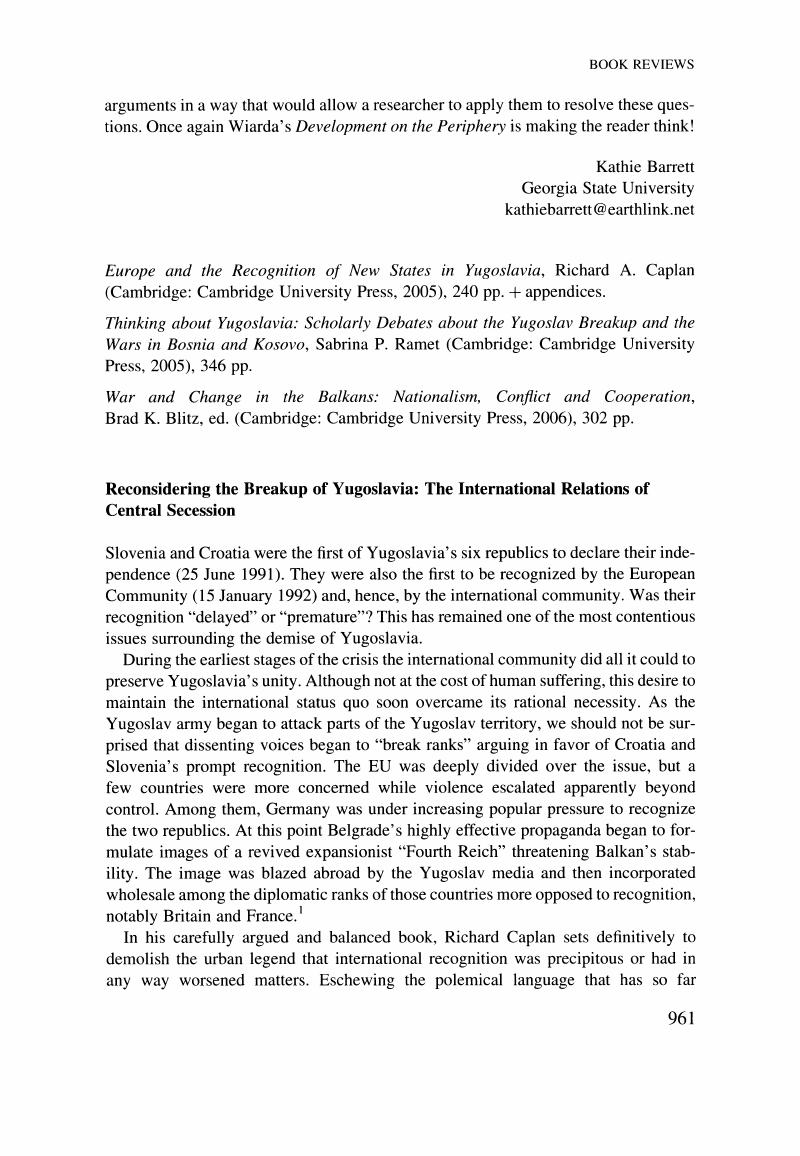No CrossRef data available.
Article contents
Europe and the Recognition of New States in Yugoslavia, Richard A. Caplan (Cambridge: Cambridge University Press, 2005), 240 pp. + appendices.
Published online by Cambridge University Press: 20 November 2018
Abstract
An abstract is not available for this content so a preview has been provided. Please use the Get access link above for information on how to access this content.

- Type
- Book Reviews
- Information
- Copyright
- Copyright © 2007 Association for the Study of Nationalities
References
Both, Norbert. From Indifference to Entrapment: The Netherlands and the Yugoslav Crisis, 1990–1995. Chicago: University of Chicago Press; Amsterdam: Amsterdam University Press, 1997.Google Scholar
Conversi, Daniele. German-Bashing and the Breakup of Yugoslavia. Donald W. Treadgold Papers in Russian, East European and Central Asian Studies, no. 16. Seattle: University of Washington Press/Henry M. Jackson School of International Studies, May
1998.Google Scholar
Conversi, Daniele. “Central Secession: Towards a New Analytical Concept? The Case of Former Yugoslavia.” Journal of Ethnic and Migration Studies
26, no. 2 (2000): 333–33.Google Scholar
Conversi, Daniele. “The Dissolution of Yugoslavia: Secession by the Centre?” In The Territorial Management of Ethnic Conflicts, edited by Coakley, John. London: Frank Cass, 2003.Google Scholar
Conversi, Daniele. “Homogenisation, Nationalism and War: Should we Still Read Ernest Gellner?” Nations and Nationalism
13, no. 3 (2007): 371–37.Google Scholar
Conversi, Daniele. “‘We Are All Equals!’ Militarism, Homogenization and ‘Egalitarianism’ in Nationalist State-Building (1789–1945).” Ethnic and Racial Studies
31, no. 1 (2008) (in press).Google Scholar
Gallagher, Tom. The Balkans after the Cold War: From Tyranny to Tragedy. London and New York: Routledge, 2003.Google Scholar
Hodge, Carole. The Serb Lobby in the United Kingdom. Donald W. Treadgold Papers in Russian, East European and Central Asian Studies, no. 22. Seattle: University of Washington Press/Henry M. Jackson School of International Studies, 1999.Google Scholar
Hodge, Carole. Britain and the Balkans 1991 until the Present. London and New York: Routledge, 2006.Google Scholar
Jones, Adam, ed. Genocide, War Crimes & the West: History and Complicity. London: Zed Books, 2004.Google Scholar
Jones, Adam
Genocide: A Comprehensive Introduction. London and New York: Taylor & Francis, 2006.Google Scholar
Kent, Gregory. Framing War and Genocide: British Policy and News Media Reaction to the War in Bosnia. Cresskill, NJ: Hampton Press, 2005.Google Scholar
Lukic, Rénéo, and Lynch, Allen. Europe from the Balkans to the Urals: The Disintegration of Yugoslavia and the Soviet Union. Stockholm International Peace Research Institute Monographs. Oxford: Oxford University Press, 1996.Google Scholar
Ramet, Sabrina P. “Explaining the Yugoslav Meltdown. ‘For a Charm of Powerful Trouble, Like a Hell-Broth Boil and Bubble': Theories about the Roots of the Yugoslav Troubles.” Nationalities Papers
32, no. 4 (2004): 731–73.Google Scholar
Ramet, Sabrina P, and Coffin, Letty. “German Foreign Policy toward the Yugoslav Successor States, 1991–1999.” Problems of Post-Communism
40, no. 1 (2001): 48–64.Google Scholar
Simms, Brendan. Unfinest Hour: How Britain Helped to Destroy Bosnia. London: Allen Lane, 2001.Google Scholar




